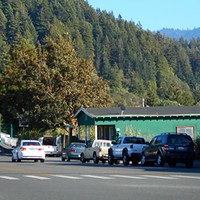Humboldt Board of Supervisors to Consider Capping Cannabis Cultivation Licenses
By Thadeus Greenson [email protected] @ThadeusGreenson[
{
"name": "Top Stories Video Pair",
"insertPoint": "7",
"component": "17087298",
"parentWrapperClass": "fdn-ads-inline-content-block",
"requiredCountToDisplay": "1"
}
]
The Humboldt County Board of Supervisors will consider next week whether to cap the total number of cannabis cultivation permits available in the county.
County Planning Director John Ford says that when the board meets in a special session March 19 to consider approving an environmental impact report and a new commercial cannabis land use ordinance, staff will also present it with a resolution that would place a 5,000-permit cap on cultivation licenses. If passed, the resolution would also require that those 5,000 permits be evenly distributed through available land in the county's 12 planning watersheds.
The subject of a permit cap is an old and controversial one in Humboldt County. Some believe it imperative to limit the cumulative environmental impact of an industry that has grown to include as many as 15,000 farms, by some estimates. Others argue that it would be folly to deny farmers currently operating in the black market a path to compliance. And still others believe strongly in a cap but fear the one proposed by county staff is arbitrary and will mostly serve as a veil of economic protection — albeit a thin one — for those already holding permits or in the process of acquiring one.
To date, nearly 3,000 cultivators have filed permit applications with the county, with almost 70 percent looking to legitimize existing grows, according to the county's final environmental impact report (EIR). Cumulatively, they seek permits for about 1,200 acres of cultivation. The county also currently plans to continue accepting permit applications for pre-existing grows through 2019 and, in its EIR, projects that it will receive about 1,000 permits for new cultivation operations.
As to the permit cap, Ford says the idea is that, if approved, county staff will figure out how much available acreage exists in each of the dozen watersheds. (Some watersheds exist almost entirely on national forest lands, so those would be off limits.) Staff would then distribute the 5,000 permits through the available acreage to come up with a specific cap for each watershed. When that permitting threshold is hit, county staff would cease issuing cultivation permits there. Ford said the idea is to treat it as a soft cap — one that would allow the board to pause and evaluate industry impacts and the efficacy of mitigation efforts before deciding whether to continue issuing permits in some or all watersheds.
Tom Wheeler, executive director at the Environmental Protection Information Center, says "watershed-based caps are a great idea" and "one the county should move forward on." But Wheeler feels the current proposal is deeply flawed.
"I think there should be a study of each individual watershed or else it's meaningless," he says, adding that caps should be based on watershed carrying capacities. "If we just kind of divvy them up by geographic area, that's kind of arbitrary and capricious. Then it doesn't seem to be an environmental cap but more of an economic protection for those permitted."
Like Wheeler, the California Department of Fish and Wildlife urges the county to take a watershed-analysis approach to setting caps that are based on specific watersheds' carrying capacities. But in its EIR, the county says that isn't feasible.
"A watershed analysis to establish cannabis cultivation caps for each watershed would be difficult for the county to conduct as it would require details on existing water users in each watershed and the extent that riparian water rights may be exercised," the document states. "The county lacks the technical experience and financial resources to collect this extent of data and determine what is the appropriate aquatic carrying capacity."
The EIR does note the county would be willing to participate in "joint watershed evaluation studies" with partner agencies, like CDFW and the North Coast Regional Water Quality Control Board.
While some believe the cap would help shield those currently holding permits or in the process of getting them from increased competition, others think the economic realities of California's regulated cannabis markets may render the issue moot.
A recent study by the California Department of Food and Agriculture estimated that the Golden State produced 13.5 million pounds of cannabis in 2016, with the North Coast region contributing about 4.15 million pounds of that total. The problem is the same study estimated that new regulated markets will only see a max of 2.5 million pounds of cannabis sold legally, leaving the vast majority of California's harvest to be sold in the black market, much of it over state lines.
Currently, the state has issued more than 2,000 temporary cultivation licenses (including 482 to Humboldt County farmers, as of March 13) for more than 400 acres of cultivation, enough, by some estimates, to far outpace the projected legal retail demand. And the state's new track-and-trace-program, once up and running, will prevent product from being diverted to the black market.
This market situation, coupled with new taxes and the very high costs of bringing an existing farm into regulatory compliance, have left many Humboldt County farmers leery of entering the system. Many don't think that's likely to change and the county isn't likely to see an influx of thousands of permit applications.
"I think there's the question of what's going to be the real cap, a regulatory cap or an economic, free-market cap," Ford says.
Thadeus Greenson is the news editor at the Journal. Reach him at 442-1400, extension 321, or [email protected]. Follow him on Twitter @thadeusgreenson.
Speaking of...
more from the author
-
Failed Leadership
- May 2, 2024
-
'On Siemens Hall Hill'
How an eight-day occupation at Cal Poly Humboldt divided campus
- May 2, 2024
-
Failed Leadership
- May 1, 2024
- More »
Latest in News
Readers also liked…
-
Through Mark Larson's Lens
A local photographer's favorite images of 2022 in Humboldt
- Jan 5, 2023
-
'To Celebrate Our Sovereignty'
Yurok Tribe to host gathering honoring 'ultimate river warrior' on the anniversary of the U.S. Supreme Court ruling that changed everything
- Jun 8, 2023







































